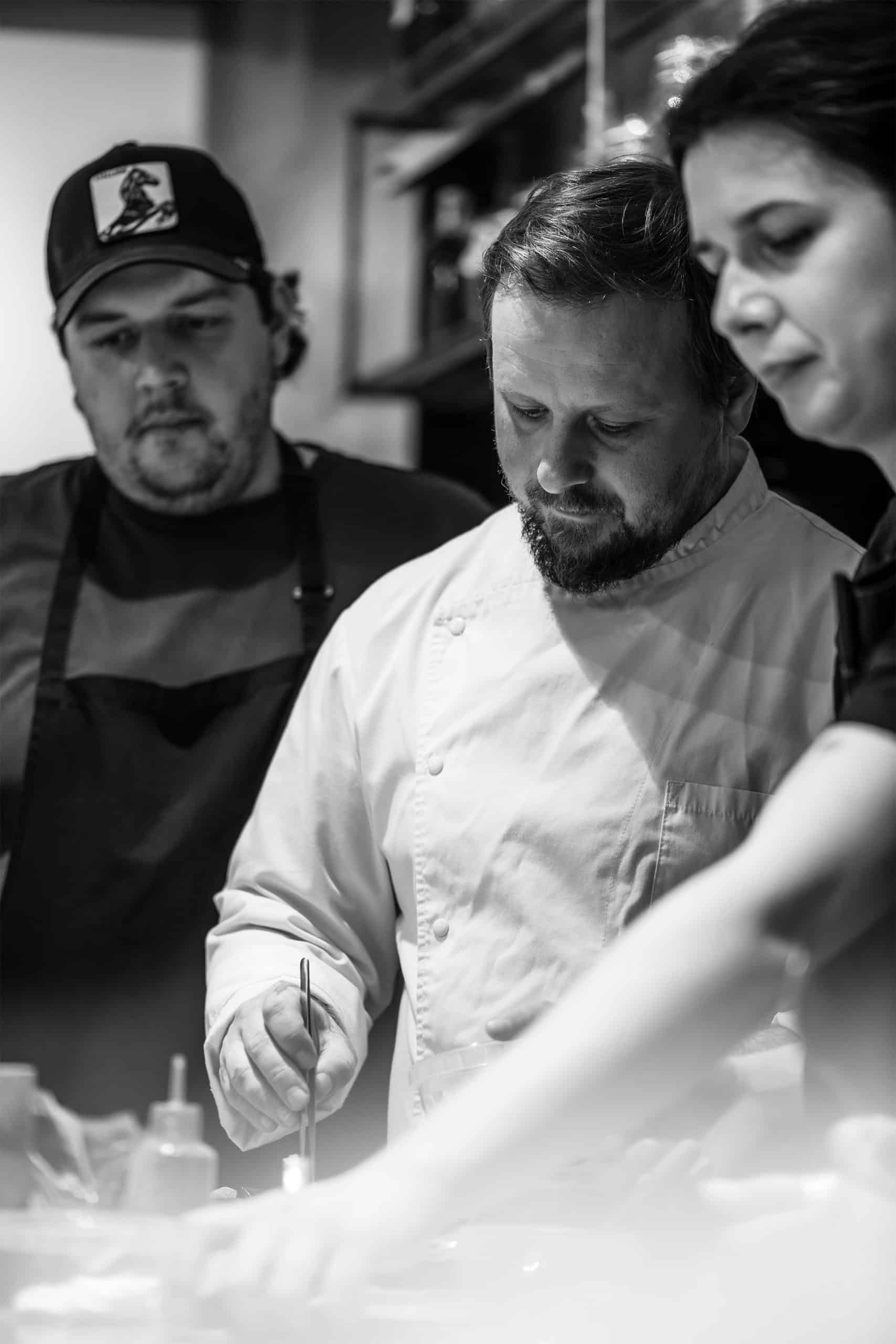Concept
In September 2021, SALT received its first Michelin Star, followed by the Michelin Green Star in 2022. The restaurant is featured in the Hungarian edition of the Gault&Millau guide with 4 toques, and in the Discovery section of the ‘World’s 50 Best Restaurants’ as well as in OAD’s ‘Top Restaurants in Europe’ list. Szilárd Tóth got 2 knives (World Class) on The Best Chef list in 2024 and 2025.
Opened in 2019, head chef Szilárd Tóth and restaurant manager and CEO Máté Boldizsár co-owns the restaurant. Before diving into opening SALT, the duo worked together in Innio.
The taste of SALT
Sustainability, handpicked herbs, traditions, fermentation, and surprising ingredient
As Chef Szilárd once said, “Sustainability is at the core of SALT. We are taking conscious steps towards a sustainable future that all have a low ecological impact. Most of our ingredients are locally grown and organic.” Based on this approach, SALT has become one of the pioneers of practising sustainability in Hungarian hospitality. Most of the dishes are innovative versions of Hungarian classics, made with local ingredients collected by the chef himself in the countryside. However, sustainability does not stop here. At SALT, finding new, sustainable ways of plating is always on the agenda. As an example, the restaurant uses unique plates made from mycelium, created in the labs of Moholy-Nagy University of Art and Design.
The team often joins Szilárd on his trips to gather indigenous medicinal plants and herbs in the wild areas of Szatmár region, Hungary, and other rural spots: they forage the woods and fields for the best ingredients nature has to offer to be served as dishes our grandmothers used to prepare. To get ready for the colder season, the team dries, salts, and ferments ingredients to be enjoyed as unique bites during the winter months. Preserving both food and heritage using traditional methods is at the heart of what SALT does.
At SALT’s little garden in Gödöllő (operated by a nonprofit organization employing people with reduced work capacities), juniper, hawthorn, crabapples, barberries, woodruff, chervil, sloe, salsify, rowan, and goosefoot are grown to be recurring parts of the dishes served at the restaurant.
Besides herbs sourced from nature, SALT includes daringly unusual—shall we say surprising —components in the dishes that are either long-forgotten elements of Hungarian cuisine or special innovations such as ants or Burgundy snails.
The exclusive, organic meat used in the kitchen—the ham and pig’s jowl bacon—is from Szatmár, produced in Szilárd’s small family butchery in the village of Nyírmeggyes.
Last but not least, one of the highlights of the menu is the SALT bread. In Hungarian food culture, bread has a symbolic, almost sacred, spiritual significance. SALT’s bread is locally leavened and baked. Everyone on the SALT team is Hungarian or comes from neighbouring regions that were formerly a part of Hungary. This includes head chef and co-owner Szilárd Tóth, who was born in Mátészalka, a small town close to the northeast border where due to the tragic loss of the local Jewish middle class, a post-World War II climate prevails. Today, the area has the second-highest unemployment rate in the country.
From this far-flung corner of Hungary, stems deeply meaningful culinary traditions. After all, difficult conditions often serve as the birthplace of creative culinary practices and traditional dishes. Zsíros deszka, roughly translated as “greasy bread,” is one of the most well-known dishes born in the region. It gained popularity as the cheapest and quickest way to alleviate hunger: a huge slice of bread thoroughly smeared with lard, sprinkled with chives or other types of onions, and in some cases, a dash of paprika.
Unorthodox drinks
When designing SALT’s wine list, restaurant owner and manager, Máté Boldizsár made sure that sustainability was key. This does not necessarily mean natural wines only; however, the team tries to work mostly with wineries that are sustainable or operate in harmony with nature.
At SALT, guests can choose from three different wine pairings. Two of them (Local and European) include wines chosen based on the above-mentioned criteria as well as what would form the most exciting pairs with the dishes. In many cases, the team tries four or five wines in the hopes of finding the best match. Since the menu is filled with naturally vibrant flavours complemented by fermented ingredients, the team’s experience made them realise that these flavours go best with natural wines. On the other hand, the Prestige wine pairing represents a more classic approach, consisting of the wines of well-known and renowned European wineries, made conventionally.
SALT also offers non-alcoholic drink pairings with fresh, homemade juices that consist not only of drinks with fruits and herbs but also ones with kombucha or water kefir. The team is continuously experimenting with new recipes and flavours to find the juices that go best with their seasonal dishes.


